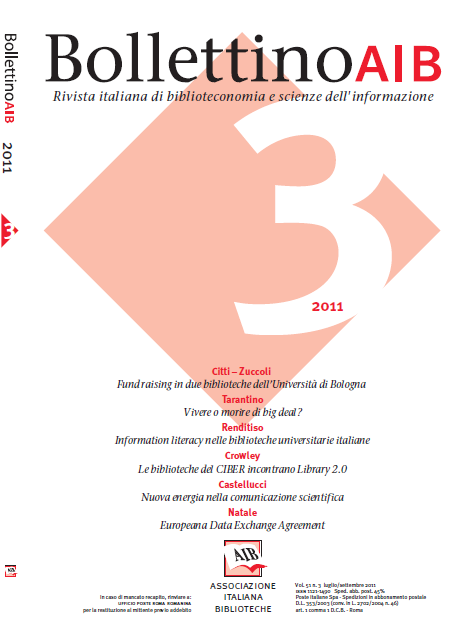To live or die of "big deal"?
Main Article Content
Abstract
For over ten years the major library systems all over the world signed with scientific publishers contracts that followed the so said "big deal" model. This kind of contract ensures access to the entire publisher's catalog at a reduced price, and recently it has been challenged because of its excessive strictness and ever-increasing price which the universities can't bear any longer, due to the continuing decrease of their budgets.
Despite some indisputable advantages - a lower cost per item, a bigger choice of journals , an essential simplification of all the proceedings and management - the criticisms focus on the large amount of unnecessary journals, on the rigidity of contracts and the progressive price rise (part due to the mergers of large companies) that limits the academic libraries' options and increasingly forces them to give up the purchase of different kinds of materials - books in the first place.
Taking account of the heated debate all over the world, the article focuses on the Italian situation and analyzes the data collected by several academic libraries. This study means to set out the strengths and weaknesses of the "big deal" model, well aware of the pressing need to make serious decisions : perhaps for libraries it will mean to give up something in terms of the offer, but it could bear considerable savings too.
Despite some indisputable advantages - a lower cost per item, a bigger choice of journals , an essential simplification of all the proceedings and management - the criticisms focus on the large amount of unnecessary journals, on the rigidity of contracts and the progressive price rise (part due to the mergers of large companies) that limits the academic libraries' options and increasingly forces them to give up the purchase of different kinds of materials - books in the first place.
Taking account of the heated debate all over the world, the article focuses on the Italian situation and analyzes the data collected by several academic libraries. This study means to set out the strengths and weaknesses of the "big deal" model, well aware of the pressing need to make serious decisions : perhaps for libraries it will mean to give up something in terms of the offer, but it could bear considerable savings too.
Article Details
Section
Articles

This work is licensed under a Creative Commons Attribution-ShareAlike 4.0 International License.
